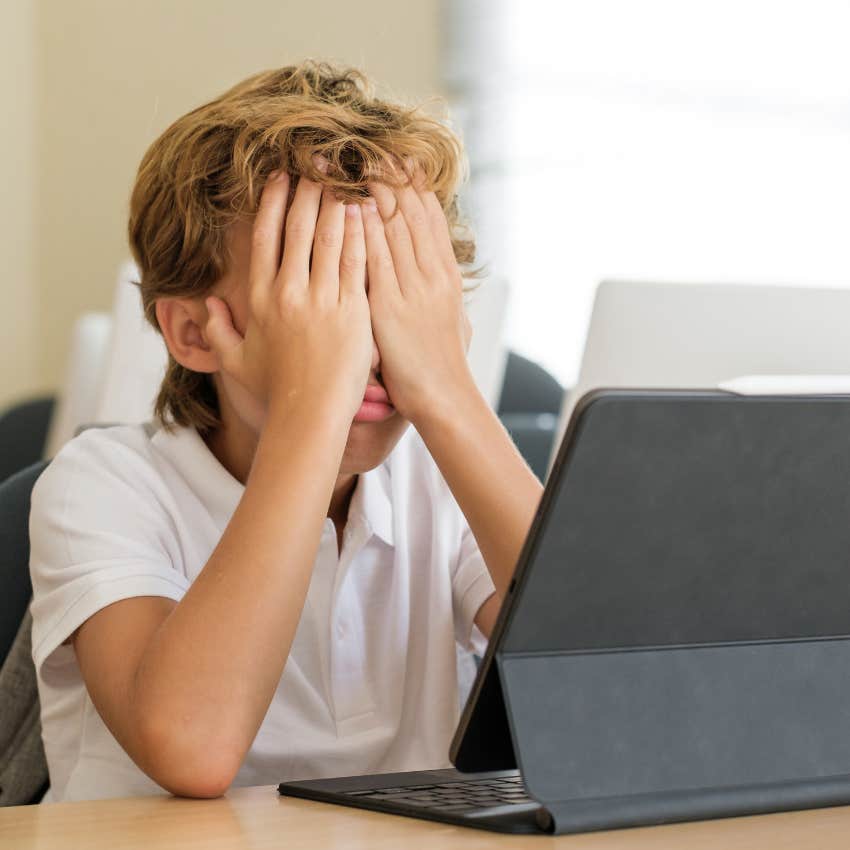Teacher Explains Why Allowing Some Kids To Turn In Late Work Isn't Unfair To Other Students – ‘It's Not About Them'
Does allowing late work in school incentivize laziness in students?
 Drazen Zigic | Shutterstock
Drazen Zigic | Shutterstock Teacher Jen, known as @strategicclassroom on TikTok, uses her platform to share tips for educators and experience in the classroom — in hopes of creating a safer, more equitable space for students and teachers to learn and grow.
Even the most controversial topics — which seemingly is allowing late work — are topics she indulges in, reminding teachers of the true meaning of their profession: advocating for students.
She argued that by accepting late work from some students in her classroom, she was giving them an opportunity to grow — not pitting them against their peers who were able to turn the work in on time.
“Students do work late or don’t do work at all for a variety of reasons,” she argued, “and regardless of the choices we make about penalties, there will still be students who turn in work late or don’t do their work at all. So what can we control as educators?”
This teacher said she lets some of her students turn in late work despite opinions arguing it’s "unfair" to other kids in the class.
Her recent video on late work seems to be in response to several comments on her page arguing that allowing late work incentivizes students to be “lazy” and sends “harmful messages” to other students in the class about acceptable behavior.
“As educators, we need to be really purposeful about the meaning of our work beyond just the grade,” she said, arguing that many teachers are hyper-focused on recordable progress rather than human progress. “What are they going to get out of it? How does it play into the long-term mastery of the course? If there’s a deadline, we need to explain why the deadline is what it is.”
The classroom isn’t a dictatorship — it shouldn’t be an uncomfortable space where teachers exercise an unyielding amount of control over their students. It should be a safe space for learning where students feel comfortable building a trusting relationship with their teacher and are comfortable asking for help or grace when they need it.
 Rido / Canva Pro
Rido / Canva Pro
For many kids, the classroom is the only stable environment they have — punishing them for uniqueness, struggles, or distractions isn’t always the right move.
“Grades are a way to communicate progress in a course between the teacher and the student… and the student’s parents, if they’re under 18.” She continued on to explain that, "Grades are not a way to pit students against each other. I don't subscribe to the school of thought that giving students grace harms other students.”
She argued that allowing late assignments isn’t putting other students at any kind of disadvantage — ‘It’s not about them.'
“Grades impact the individual, not the rest of the class,” she adds. “Anytime I talk about late work or not penalizing late assignments, there are always people in the comments who say, ‘What about the students who did it on time?’ My answer is that it’s not about them.”
One in 14 students loses a parent while in school. 37% of students experience anxiety disorders, 15% report they’ve considered ending their life, and 29% admit they are essentially a primary caregiver for people in their families. School, completing assignments, and meeting deadlines are not always a priority for students — oftentimes, coming to school is more about socializing, finding an escape, and enjoying carefree companionship than class.
It’s an unfortunate reality that many teachers come to terms with when they start their careers, but it’s a simple fact that’s essential to understand. You can’t truly teach students or help them master material without understanding what’s going on behind the scenes, whether that’s in their personal lives at home or with other peers in the classroom.
Especially with rigid curriculums and unique learning struggles, this teacher provides grace where she can — ‘My job is to help students learn.’
Over 4 million students in the U.S. alone struggle with learning disabilities that impact their educational performance — whether intellectually in the classroom or socially with other students. While many districts attempt to use unique curriculums and learning plans to support those students, many still struggle to keep up with their peers in the classrooms.
Many teachers consider “general policies” for late work to be discouraging and harmful in the classroom — oftentimes incentivizing a kind of expectation that might allow students to fall behind on coursework easier than a general “ban” might. However, as educator Justin Baeder admits on TikTok, there’s almost always a personal reason why students fall behind on work or struggle to submit assignments on time — allowing late work can help to support them in catching up.
Discourse about the profession often reminds people that teachers carry the burden of more than just teaching — helping to support mental health struggles with their students, learning disabilities, and personal life events at home are just a few of those things. In allowing late work in unique scenarios, teachers create an easy loophole to help support these struggling students — giving them an opportunity to heal, grow, and track their progress in the classroom without automatically condemning them for falling behind on rigid deadlines.
 Addictive Stock / Shutterstock.com
Addictive Stock / Shutterstock.com
“I don’t penalize executive dysfunction or taking longer to learn something,” Jen added, “because for me, that is not the point of grades…at the K-12 or even the undergrad level, one student’s grade does not impact anybody else. It’s simply a tool for communication.”
Especially considering students’ grades are often used as a barometer for tracking a teacher’s success in the classroom — which, in some cases, can be problematic — it’s in everyone’s best interest to take a step back and think about what’s best for every student. How can we help support struggling students in learning and growing without continuously reprimanding them for falling behind?
Zayda Slabbekoorn is a News & Entertainment Writer at YourTango who focuses on health & wellness, social policy, and human interest stories.
